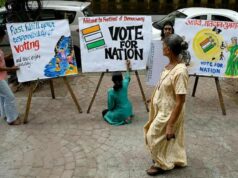China Grudgingly accepts India as an Equal

India officially assumes the rotating presidency of the Group of 20 (G20) on December 1. Indian Prime Minister Narendra Modi previously said in his closing remarks at the G20 Summit in Bali, Indonesia, that it is a matter of pride for every Indian as the country takes over the presidency.
Since Modi came into power, India has started to downplay its appeasement diplomacy, while turning into a leading power diplomacy. Compared with the non-alignment diplomacy advocated by the Indian National Congress (INC), the leading power diplomacy promoted by the Bharatiya Janata Party (BJP) and the Modi led Government has brought subtle changes to India’s strategic orientation.
First, India is more proactive in diplomacy. When the INC was in power, India’s diplomacy was generally defensive. In contrast, the BJP, which represents Indian nationalism, is more proactive in the diplomatic field. The BJP has downplayed India’s submissive role as a developing country. It regards the role of a major power as India’s diplomatic right, advocates being on an equal footing with other world powers and expands India’s interests worldwide. It is more proactive and independent.
Second, the US and Western elements are now being dealt as equals in India’s diplomacy. Non-alignment diplomacy now focuses on India’s positioning as the leader of developing countries. It advocates jointly rising with existing Super powers strategically and handling the challenges posed by either China or USA to the rest of the world.
This has kept US-India relations sluggish. Both the US and China have been invited to have bilateral relations With India as equals. Since the BJP came into power, it is determined to realize India’s dream as a Super Power second to none and it has a strong motivation to turn to a leading power diplomacy.
To achieve the status of a Super Power diplomatically, the BJP believes India should first break the geopolitical identity shackle of an Asia-Pacific country. India is playing the US card quite well. For New Delhi, it is clear that the US cannot realize its goal in Indo-Pacific Strategy without India’s cooperation.
This not only increases India’s importance, but also boosts India’s strategic leverage and enhances its initiative in foreign relations. After Galwan even China has realized that India is fully capable to thwart any Chinese misadventure. Beijing has realized that it must settle both the Indo Tibet and China Tibet boundary at the earliest or risk losing both Tibet and Xinjiang, sooner than later.
The full control exercised in overcoming the Wuhan Virus pandemic and the handaling of Russia-Ukraine conflict have accelerated India’s position in World diplomatic strategy. New Delhi believes that the needs of the US and the West for itself are increasing. Washington has been increasingly pleading to India to increase its participation in Quad and launched the Indo-Pacific Economic Framework, which has also strengthened India’s belief in this regard.
Besides, security factors are increasingly prominent in economic and trade cooperation. Leading power diplomacy requires economic size and strength that can match India’s status. For this reason, the Modi administration has proposed many initiatives such as “Make in India,” aiming at seizing the opportunities in the process of the reshaping of global economic structure and at leading India to become a new manufacturing base in the world and a global economic power.
So no wonder, now on the one hand, Western multinational companies are transferring production capacity from China to India, on the other hand, India has categorically told China to resolve the Indo Tibetan boundary and then only both can concentrate on economic and trade cooperation. Indeed, China is trying its best to improve relations with India, but the Tibetan factor’s impact on the two countries’ economic and trade cooperation also cannot be ignored.
Last but not least, China now increasingly needs stable relations with India for the sake of its future development and Unity as a Country. Although there have been some other factors in India’s economic and trade cooperation with China, the total trade volume between China and India reached a record high in 2021, which shows there is a huge potential for cooperation in the two countries’ industrial structure. India believes that it is at the critical point of an economic take-off and it is capable of achieving high growth in the next 15 to 30 years.
This requires India to first ensure a peaceful and stable economic development environment in the World. India bilateral relationship with most of the countries have improved tremendously, but there is still friction and conflict with China which is not conducive to either’s development. The diplomatic and military communication between China and India though has not stopped, and India is also constantly thinking about how to create an external environment that benefits its development.
India has refused to become strategic vassal of any power. It aims at realizing its own strategic interests. Therefore, maintaining close friendship with Russia, Israel, France, ASEAN, Japan and stable relations with US, Iran and China is one of the main aspects of India’s leading power diplomacy. With the rise of India, interests of major powers will be increasingly intertwined. Improving bilateral relations with India is becoming an important prerequisite for most countries to realize their dreams. Existing major powers and developing countries, must work to maintain their relations with India in a mature and wise manner.



